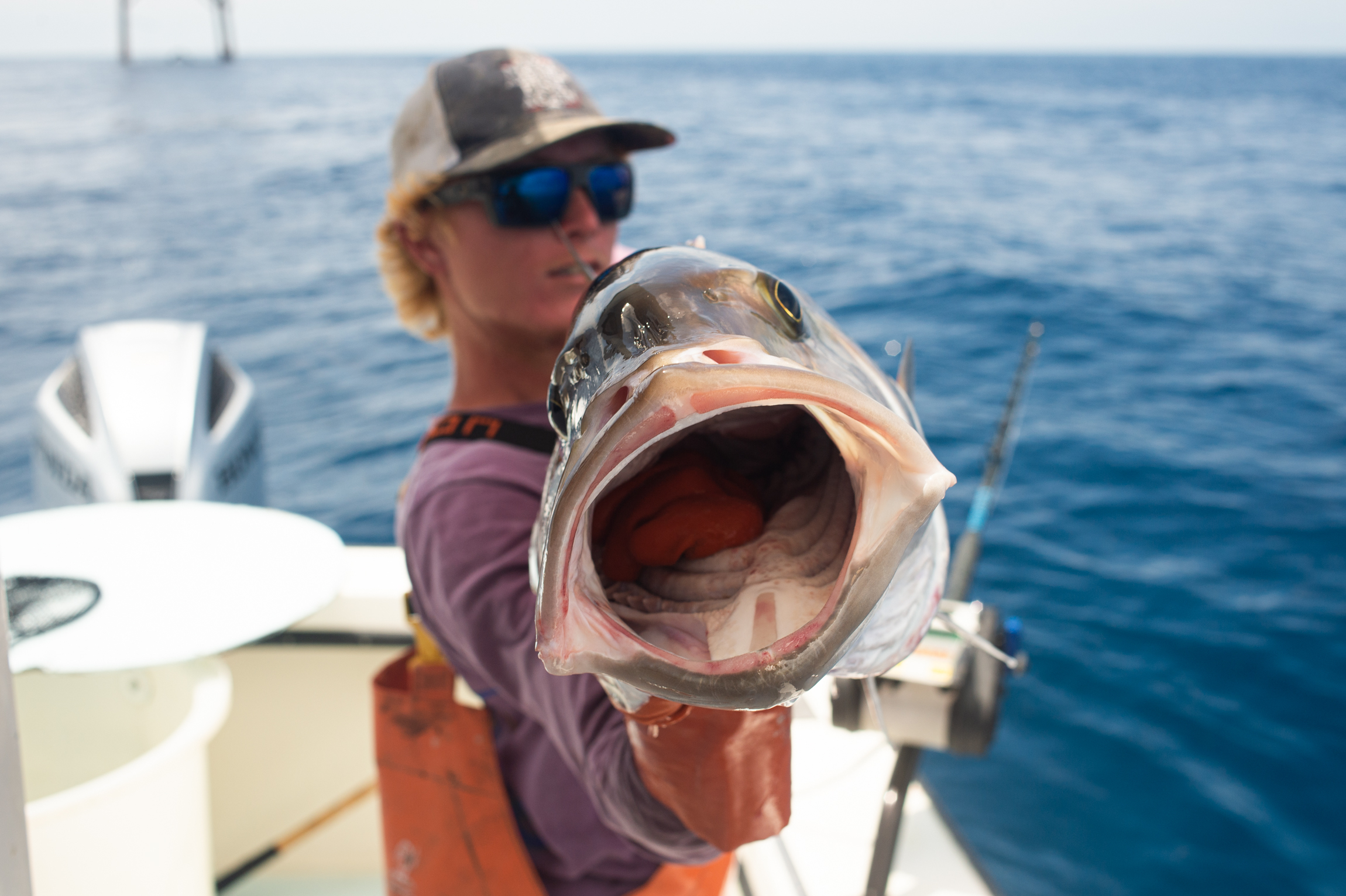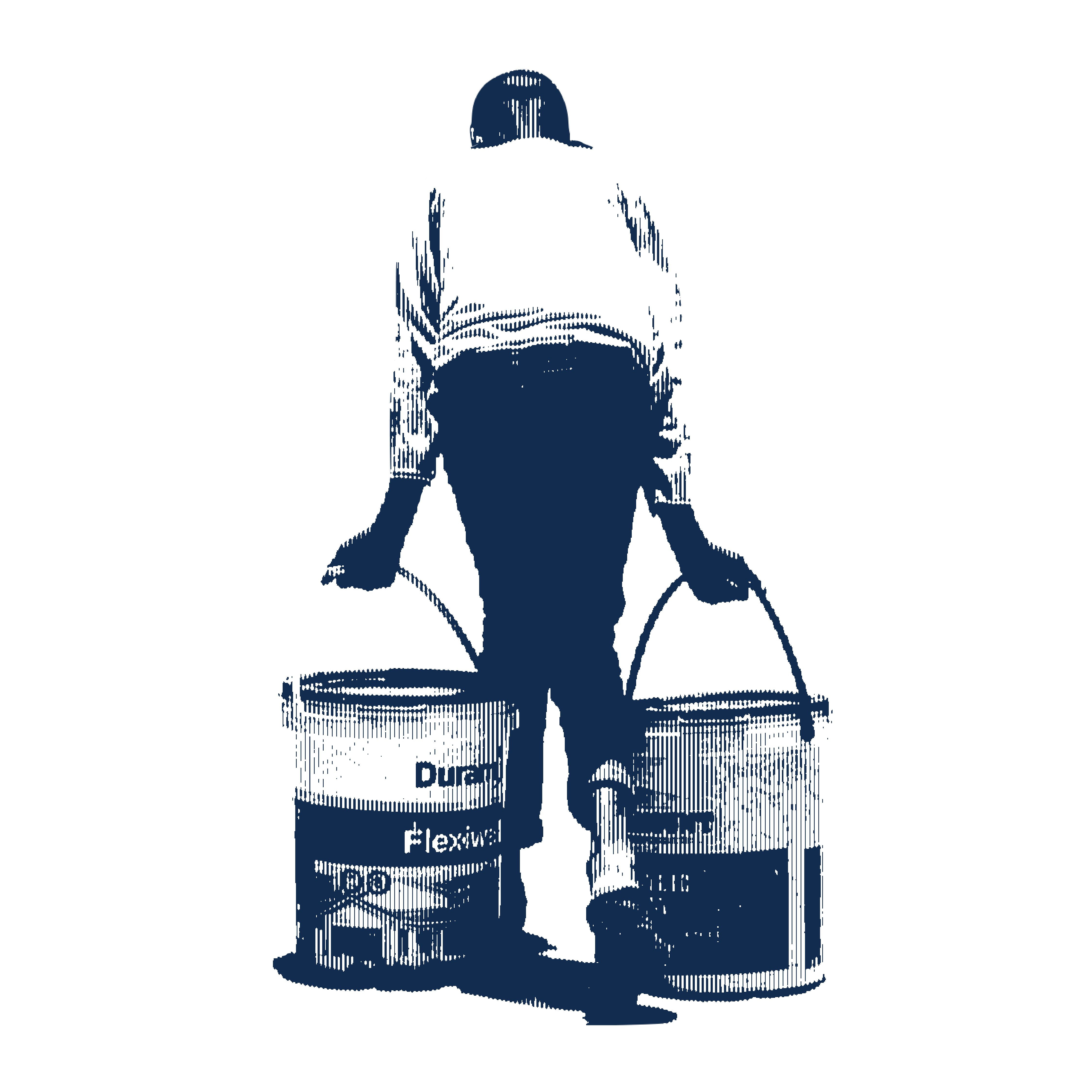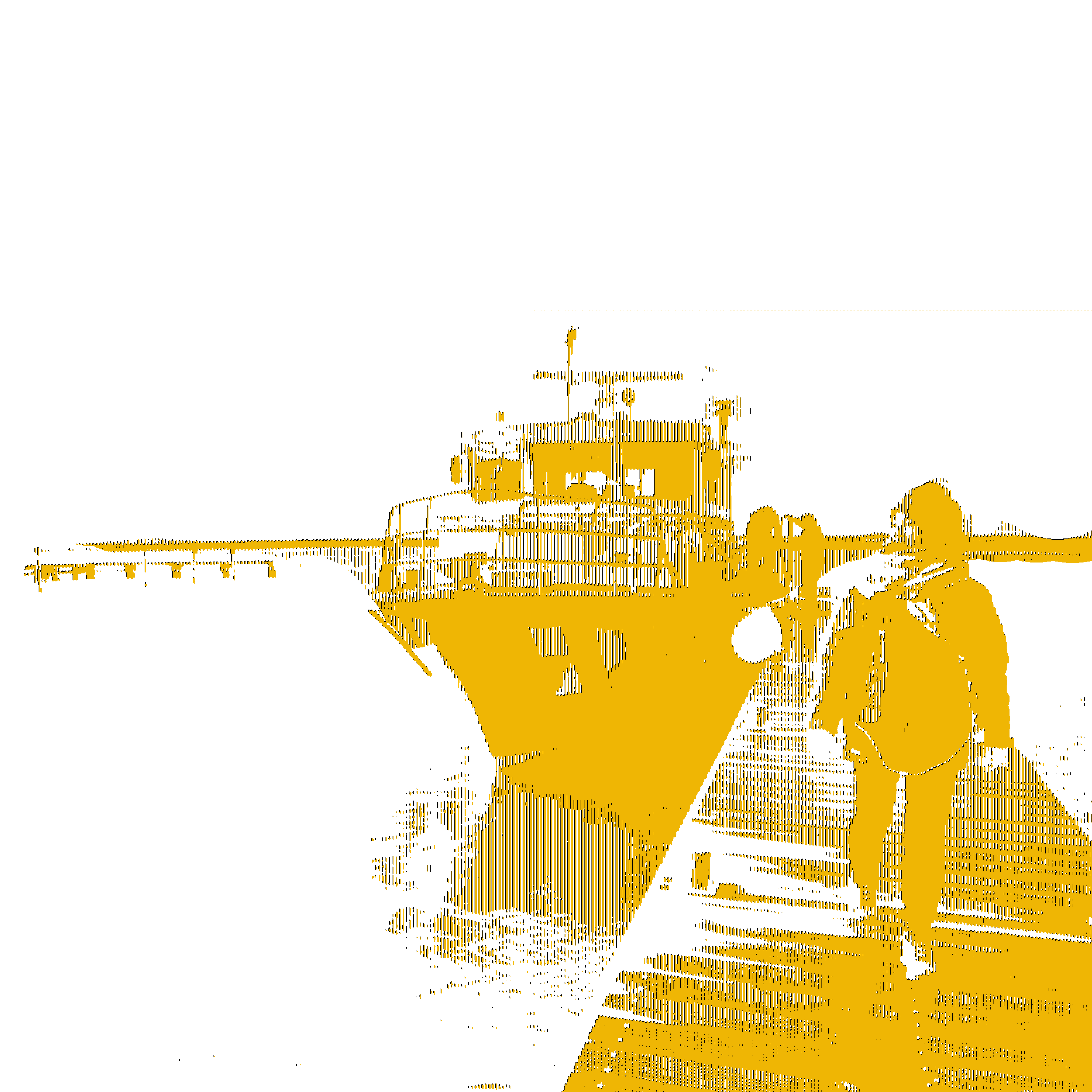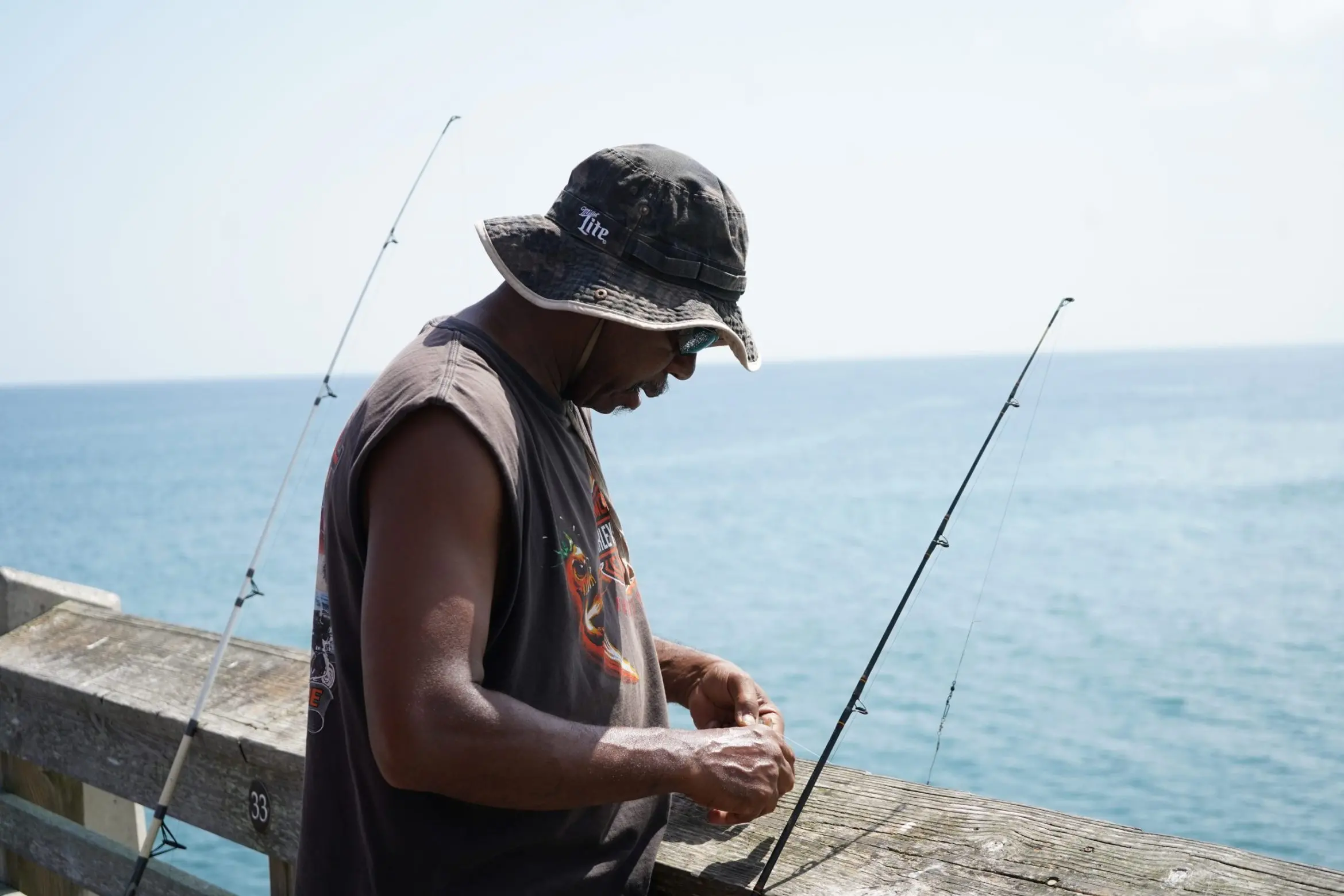
A warming climate leads to greater weather extremes and impacts the distribution of marine life in North Carolina’s coastal waters, scientists say.
The changes occurring challenge the state’s fishing industry and other secondary industries that rely on the catch. But the effects trickle down and place a burden on the state’s most economically vulnerable coastal residents dependent on access to seafood to provide income and help feed their families.
Local anglers who rely on their catch for food often fish from spots along the shore, not boats. Although sales of recreational fishing vessels are at a record level, the price is beyond the reach of individual anglers at the bottom rung of the state’s economy.
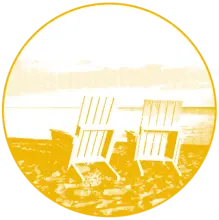
As a nonprofit journalism organization, we depend on your support to fund our nationwide Connected Coastlines climate reporting. Donate any amount today to become a Pulitzer Center Champion and receive exclusive benefits!
Shore fishing from piers, beaches, banks and roads is at the front line of the climate crisis because they are at sea level.
“Not everybody has a boat to fish from, so what happens when you have damage to docks, erosion, water quality issues, sea-level rise or habitat loss?” said Jessica Whitehead, director of the Institute for Coastal Adaptation and Resilience at Old Dominion University in Norfolk, Va.
“Will there still be places you can fish?”
Her job focuses on an interdisciplinary approach to addressing the impact of climate change on coastal communities.
“There’s been a lot of work done in North Carolina on the ways that the coast is changing,” said Whitehead, formerly North Carolina’s first chief resilience officer with the N.C. Office of Recovery and Resiliency.
“For example, the shift from working waterfronts to homes and condos. Not always included in the conversation is how the state’s poorest residents are handicapped by climate change.
“Climate change is not just a question of science, government, or engineering. It also involves the social importance and economic security of things like fishing.”
State of the climate
While the effects are local, the catalyst is a global problem.
The latest U.N. scientific report on climate change released in early August insists that a hotter future is certain and humans are to blame.
Warming is inevitable for the next 30 years because carbon-dioxide takes decades to break down. According to the report, some changes are already “locked in.”
One result of the shift is evident in the skies over North Carolina’s coastline, including frequent weather extremes, once considered rare or unprecedented. 2020, for example, was the state’s second wettest.
To blame was a record-breaking Atlantic hurricane season. Only one storm made landfall as a hurricane, but the state was soaked by the remnants of eight additional tropical systems.
Sea levels will continue to rise as ice on land melts and oceans warm and water expands. More frequent flooding will impact coastal habitats and fisheries.
Extreme storm surges will erode shorelines and kill vegetation in maritime grasslands, tidal marshes, estuaries, lower reaches of coastal plains rivers and low-lying wetlands.
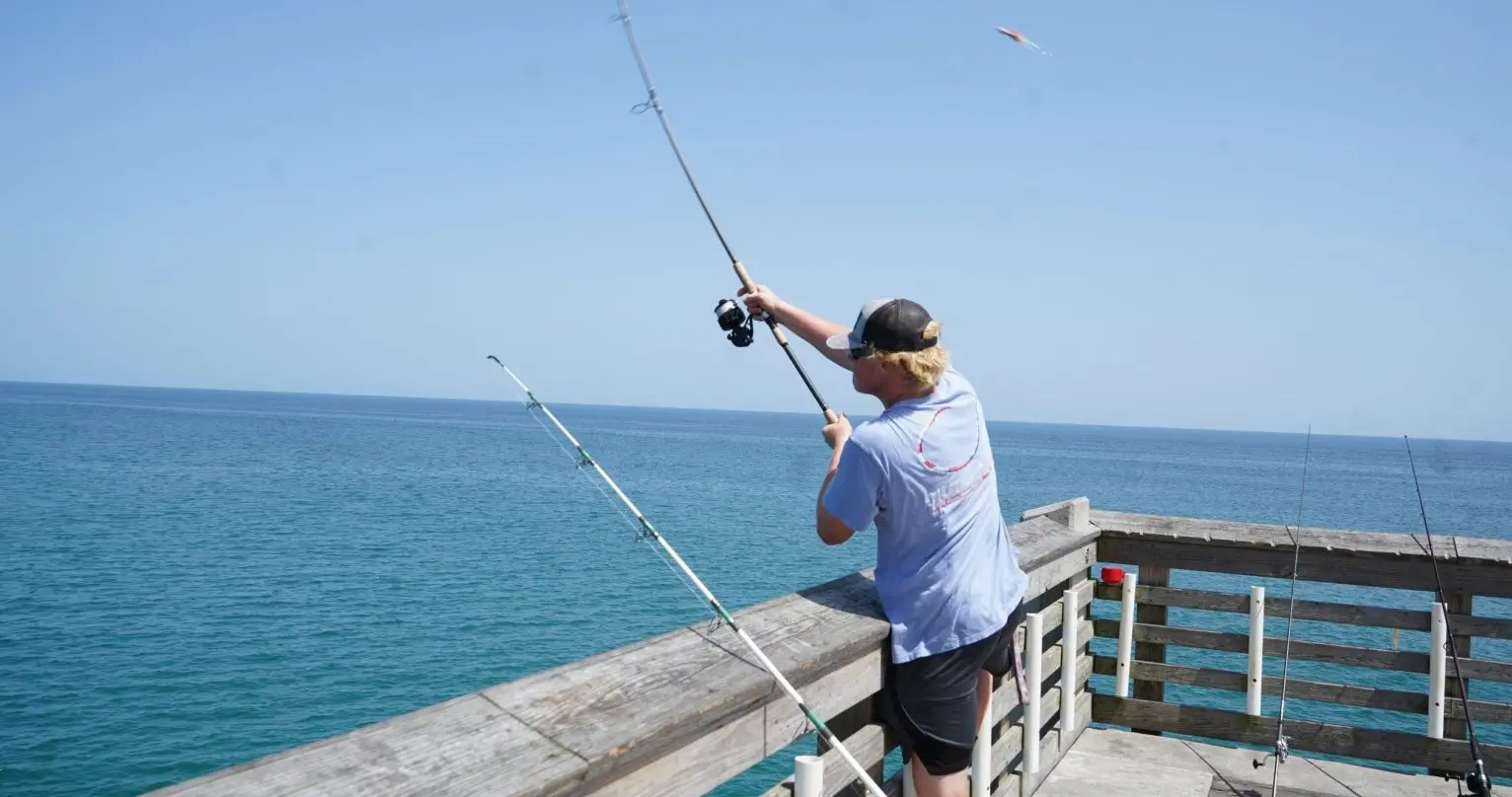
Extreme tides, storm surges and more intense rainfall will also affect land use and public infrastructure, such as piers and boardwalks.
“Piers offer access to people from all walks of life, a wide range of income, different races and different levels of fishing ability,” said John Hadley, an economist with the South Atlantic Fisheries Management Council who authored a Division of Marine Fisheries social and economic study of piers in 2012.
Some people fishing from piers on the North Carolina coast may be recipients of a fishing license waiver. Included in 2006 legislation, the program is intended to allow low-income state residents to fish for free, either for recreation or to serve dinner.
According to the N.C. Division of Marine Fisheries, in 2019, 30,469 people received a recreational fishing license waiver. The number of waivers is one-tenth of all recreational licenses issued to North Carolina residents, evidence that many people in North Carolina use a hook and line to feed their families.
In September 2018, Hurricane Florence crashed into land near Wrightsville Beach, then tortured the state’s central coast with fierce winds, devastating rain and a record-breaking high tide and tidal surge.
Recorded rainfall totaled 17 inches in New Bern, 25 inches in Newport and 33 inches in Swansboro.
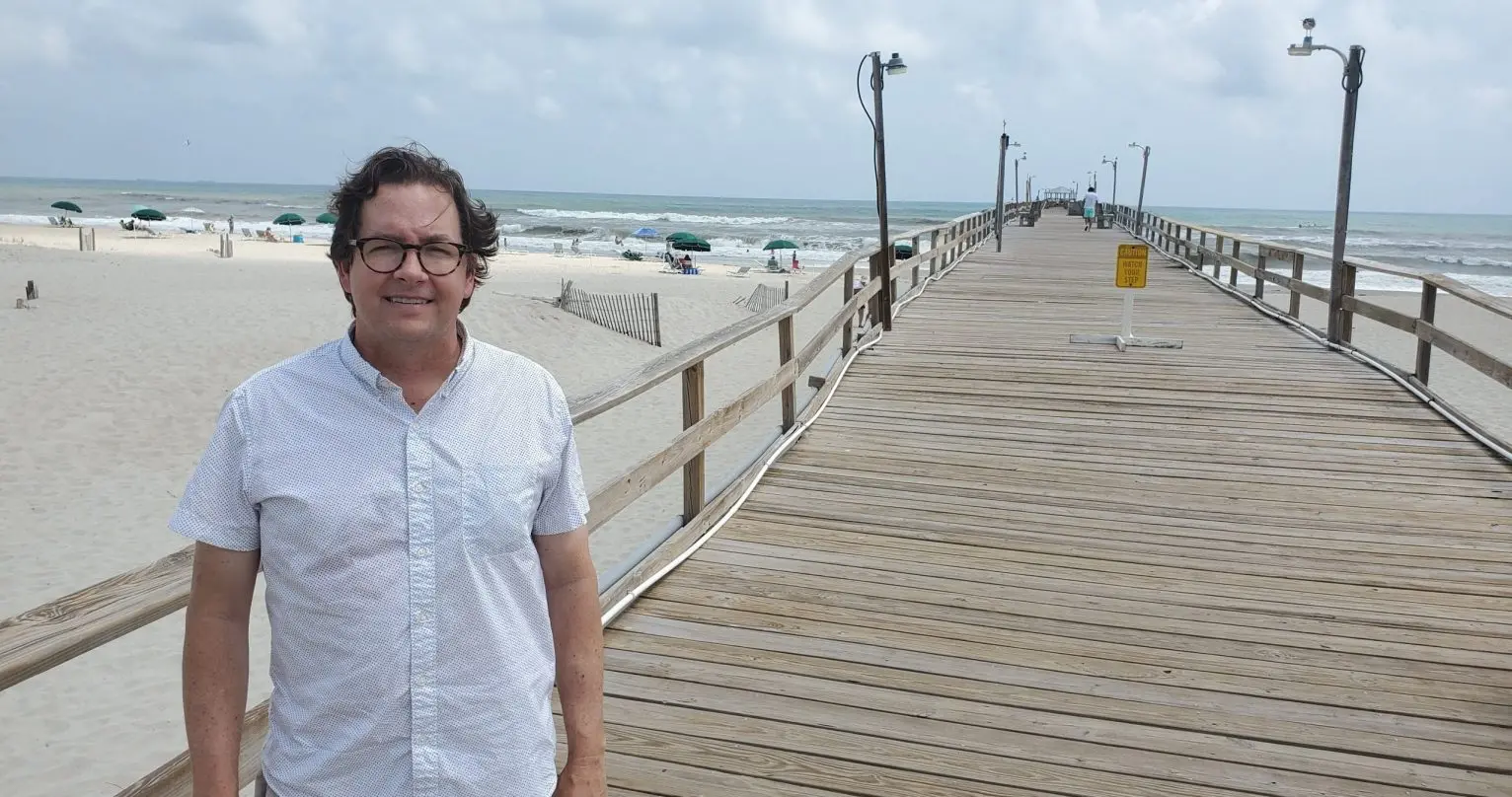
Among the casualties of Florence was Atlantic Beach’s 60-year-old Oceanana Pier, which had also sustained damage from Hurricane Irene in 2011.
Trace Cooper and his family, the owners of the pier, decided to rebuild in spite of the potential for more frequent and punishing storms in the future due to climate change.
According to Cooper, who also serves as Atlantic Beach’s mayor, it wasn’t an easy decision.
Cooper told Carolina Public Press last year that the cost to repair the pier is roughly $1,000 per foot. The last rebuild in 2018 and 2019 was nearly $300,000. Since the price of insurance is prohibitive, the Coopers incurred the entire cost to restore the pier.
“If you do the math, if we go 15 to 20 years without a hurricane, it makes sense to rebuild,” he said. “We’ve lost the pier twice in a decade. That’s never happened before.”
In the 1990s, Bogue Banks, a 21-mile barrier island near Morehead City, once anchored seven ocean piers to its shore.
Today, just two remain on the island; the 1,000-foot-long Oceanana is one of them. Two piers in Atlantic Beach, the Sportsman’s Pier and the Triple S Pier, were razed in 2006 to make room for development.
The heyday of seaside piers, Cooper said, was the 1950s and 1960s.
Cooper’s grandfather, A.B. Cooper Sr., built the Oceanana Fishing Pier and a motel in 1959. The 8-acre property bounded by State Road 58 on one side and the Atlantic Ocean on the other also includes several dozen vacation trailers whose owners lease land from the Oceanana.
“For a long time, if you wanted to fish on the ocean, you had to go to a pier,” Cooper said.
At the height of the pier boom, in 1980, there were 36 ocean piers along the state’s coast. Now, there are fewer than two dozen.
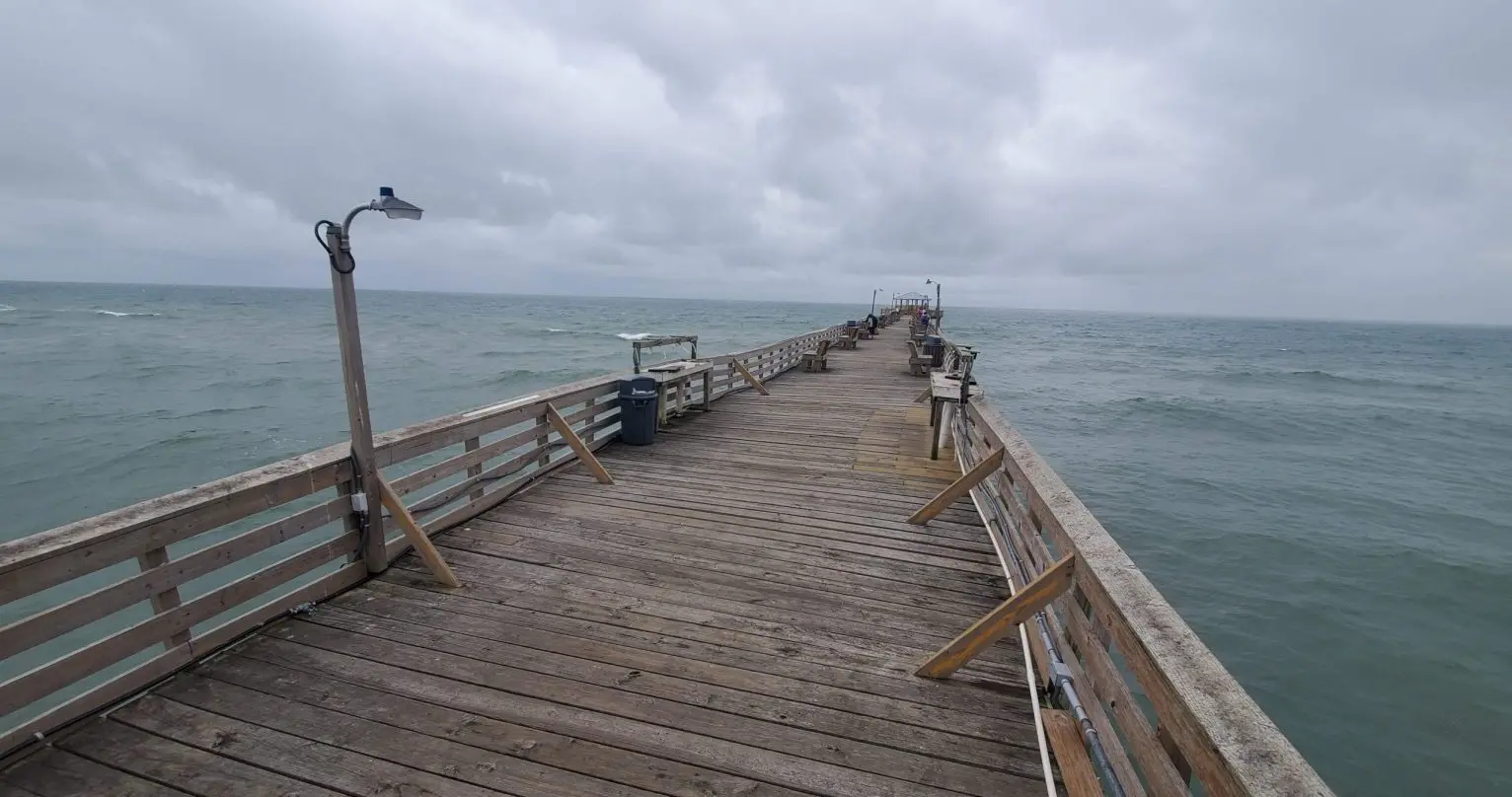
Yet the pier has remained more pluralistic, economically speaking, than perhaps the rest of Atlantic Beach. Much like public spaces and public parks, piers may be more inclusive and a shared place because of the low entrance barriers.
The destruction of piers is just one example of the mounting intensity of the weather hazards prompted by climate change, according to a message from Gov. Roy Cooper in the state’s Climate Risk Assessment and Resilience Plan. The severe weather may intensify existing social inequalities and hamper the ability of economically challenged counties to adapt in the coastal region.
Fishing woes in Tyrrell County
In some counties, fishing is an essential way of life for people trying to eat.
That includes Tyrrell County in Northeastern North Carolina along the Albemarle Sound. A 2016 North Carolina Sea Grant survey of Tyrrell County citizens found that more than 50% are dependent on catching fish to help with their grocery bills.
Located on a low-lying peninsula, Tyrrell is prone to floods and especially vulnerable during hurricanes. Though it was spared the worst of Florence in 2018 when it made landfall, the impact came later when heavy rains inland caused the Scuppernong River and other bodies of water to rise and flood low-lying areas.
David Clegg, the county manager, said Tyrrell County is the delta of North Carolina.
“You start the discussion from the understanding that you’re in a swamp,” Clegg said. “There is not a square inch of the county that is not in a swamp.”
With a population of just 3,200 in the 2020 Census, Tyrrell County is the least populated in the state. It’s also among the poorest.
The economic viability of the county is dependent, Clegg said, on the “three Fs” — farming, forestry and fishing.
Often residents have their hands in each of the three, of which fishing is roughly 30% of the county’s economic output.
“People could work at the warehouse in the fall, work with black gold potatoes in the spring and summer, and work in the crab house in the winter,” he said. “You could cobble together a livelihood.”
And access to fish, such as crabs, is particularly meaningful in a county where 1 in 4 residents are food insecure.
According to Clegg, many supplement their income by harvesting crabs and selling them to suppliers or having them for dinner.
“I can’t keep county employees in positions because I can’t pay them as much as they can make crabbing,” he said.
However, access to crabs is threatened by climate change.
Fishers are adapting to crab pots to deal with changing currents and buying more nets and line because they must go deeper.
Not only that, Clegg said, but “every time there’s a storm or we have a nor’easter all of a sudden, in some parts of the county, you can’t get there from here. You don’t get to say, ‘Oh yeah, I can take the bypass.’ There is no bypass.”
The road system on the peninsula also connects visitors to fledgling ecotourism destinations, such as Pettigrew State Park, the Alligator River Game Land and Alligator River National Wildlife Refuge. More than 50% of Tyrrell County is public land and a meaningful destination for birders and nature lovers.
The county has taken steps to address the potential for more flooding in the future, but Clegg said it has no official climate resilience plan.
“You know they say a bad day fishing is better than a good day working, but you still want to catch something.”
Jessica Whitehead, director of the Institute for Coastal Adaptation and Resilience at Old Dominion University and former chief resilience officer with the North Carolina Office of Recovery and Resiliency.
“It’s essentially an ad hoc plan,” Clegg said.
“I’ve just had to raise the Social Services Department (building) a couple of feet so that it won’t flood anymore. I’m moving the county maintenance garage because it floods so badly.”
Whitehead of ODU is concerned that losing access to fishing sites due to flooding and sea-level rise may be compounded by other environmental factors.
“You know they say a bad day fishing is better than a good day working, but you still want to catch something,” she said.
When the fish don’t bite
A short way east of Tyrrell County at Jennette’s Pier in Nags Head, people fishing on a hot August afternoon talked about poor luck, possibly due to the sweltering temperatures, but they were less certain about the role of broader climate change.
“My experience is that the water is too hot, and the fish are finding deeper water to live in,” said Dennis Scott. “As far as the environment is concerned, I don’t think that’s an issue.”
Others along the pier had similar observations and various suggestions for what is undermining the fishing.
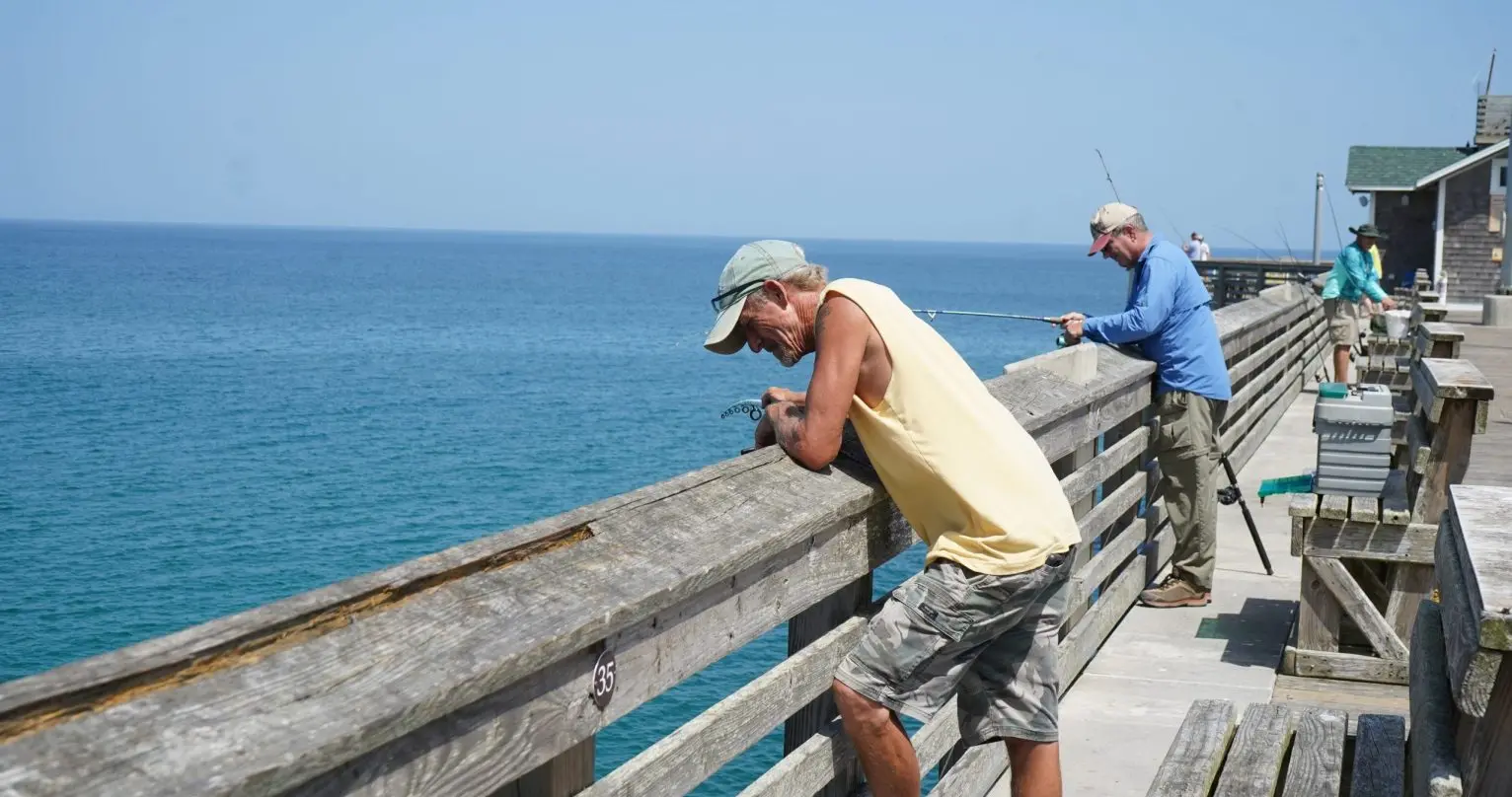
Like Scott, William Murwin pointed a finger at the hot weather. “It’s been pitiful everywhere,” Murwin said. “I go fishing just about every day, and I don’t catch anything. And I got oodles and oodles of stuff to fish with. It’s just too hot. They are down deep.”
However, Anthony Ramirez speculated that too many small fish are spoiling the fishing.
“I’m not catching fish like I used to,” Ramirez said. “I think everybody is going through the same thing. Crabbing is the same way. I believe there are so many baitfish out there, they have too much to eat.”
To Blake Huling, multiple causes underlie the fishing woes, though he doesn’t think the blame should go to commercial fishing.
“To be honest, everybody is going to have problems now and then,” Huling said.
“What I think, it runs in a cycle of what fish do. I don’t think that it is related to commercial fishing. It’s more related to the water temperature, the tide, the moon. It’s just a phase that fishing goes through, year by year. Last year wasn’t that great, and it has not been that great so far this year. It just runs in cycles.”
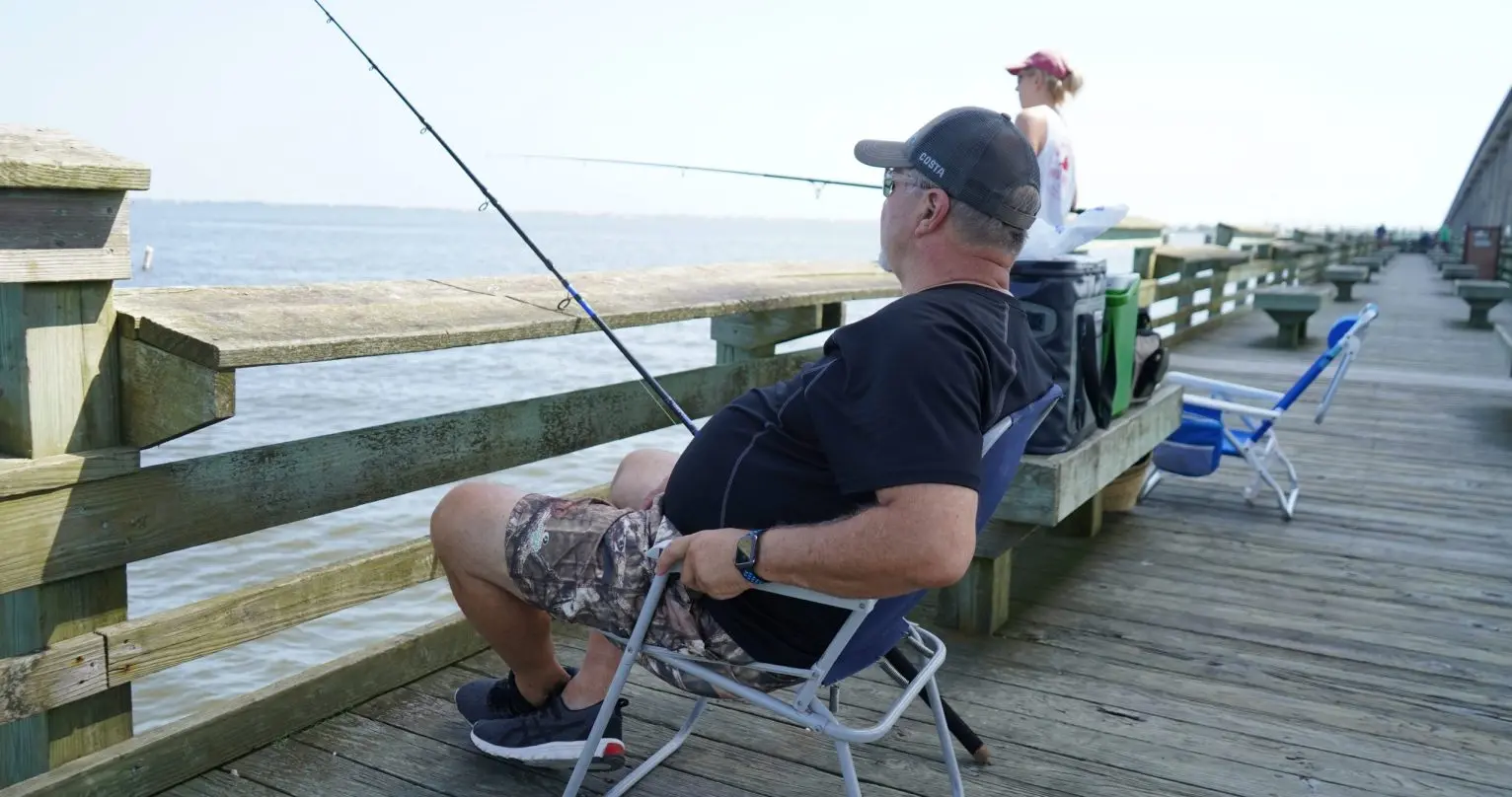
In nearby Manteo at the Washington Bridge, Richard and Fran Barger were among about 10 people also braving the August heat to try their luck. Like others, they said the fishing has been poor and see multiple culprits.
“Before, we used to catch fish all day; now, we fish all day and catch nothing,” Richard Barger said.
“Overfishing, pollution, it’s multiple things. It’s frustrating … A lot of people are saying the same thing, fishing is not like it used to be.”
Fran Barger agreed: “There were times when I threw my line out, I caught a croaker right and left. … Unfortunately, I haven’t experienced it lately. I figure I’m using the wrong bait.”


